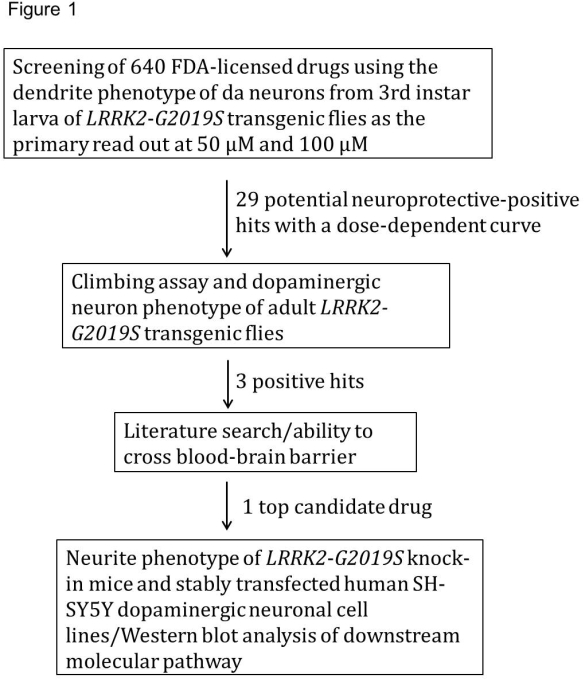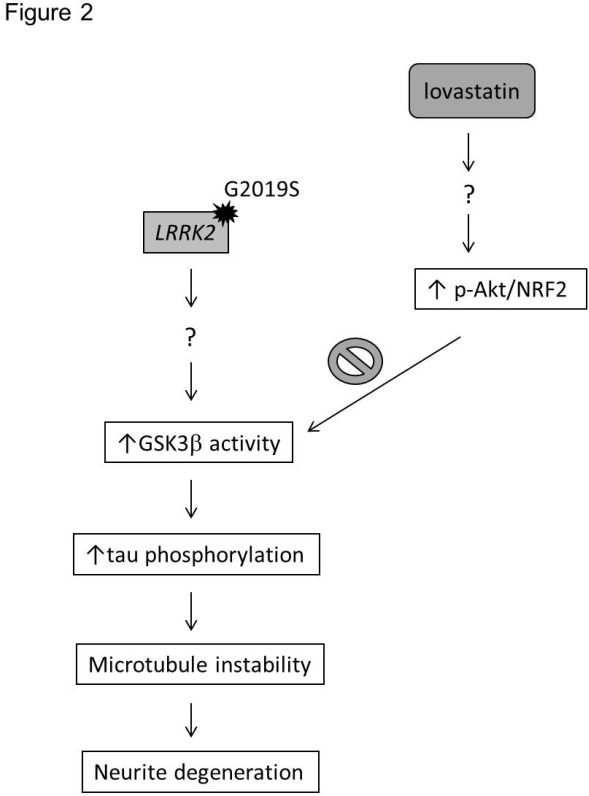Session Information
Date: Thursday, June 23, 2016
Session Title: Pharmacology
Session Time: 12:00pm-1:30pm
Objective: To identify disease-modifying therapy for LRRK2-G2019S parkinsonism.
Background: Leucine-rich repeat kinase 2 (LRRK2) is the most common genetic cause of Parkinson’s disease (PD) without a disease-modifying therapy yet.
Methods: We performed an in vivo drug screen in a Drosophila model of LRRK2-G2019S parkinsonism to identify compounds that could rescue the phenotypes of neurite degeneration, dopaminergic neuron loss, and motor activity deficit. Candidate agents with beneficial effects in fly models were then further tested in LRRK2-G2019S knock-in mice and stably transfected human dopaminergic neurons.
Results: Of 640 compounds, 29 rescued the neurite degeneration phenotypes and 3 restored motor disability and dopaminergic neuron loss in aged LRRK2-G2019S flies. Of these three drugs, lovastatin has the highest lipophilicity to cross blood-brain barrier. In LRRK2-G2019S knock-in mice and stably-transfected human dopaminergic cells, lovastatin significantly rescued the neurite degeneration in a dose-dependent manner. The beneficial effect of lovastatin is exerted through activation of the anti-apoptotic Akt/Nrf signaling with decreased caspase 3 level. We also observed that treatment of lovastatin inhibited GSK3β activity, the downstream kinase of Akt, by up-regulating phospho-GSK3β (Ser9) and subsequently decreased tau phosphorylation, which has been linked to neuronal cytoskeleton instability. Pre-treatment with Akt inhibitor A6730 blocked the lovastatin-induced neuroprotective effect. The rescuing effects of lovastatin in LRRK2-G2019S da neurons were also abolished while co-expressing a mutant allele of Akt, Akt104226, or a constitutively active form of GSK3β, sggS9A.
Of these three drugs, lovastatin has the highest lipophilicity to cross blood-brain barrier. In LRRK2-G2019S knock-in mice and stably-transfected human dopaminergic cells, lovastatin significantly rescued the neurite degeneration in a dose-dependent manner. The beneficial effect of lovastatin is exerted through activation of the anti-apoptotic Akt/Nrf signaling with decreased caspase 3 level. We also observed that treatment of lovastatin inhibited GSK3β activity, the downstream kinase of Akt, by up-regulating phospho-GSK3β (Ser9) and subsequently decreased tau phosphorylation, which has been linked to neuronal cytoskeleton instability. Pre-treatment with Akt inhibitor A6730 blocked the lovastatin-induced neuroprotective effect. The rescuing effects of lovastatin in LRRK2-G2019S da neurons were also abolished while co-expressing a mutant allele of Akt, Akt104226, or a constitutively active form of GSK3β, sggS9A.
Conclusions: Our findings suggest that lovastatin restores LRRK2-G2019S neurite degeneration by augmenting Akt/NRF2 pathway and inhibiting downstream GSK3β activity with decreasing phospho-tau. 
References: 1. LRRK2 G2019S mutation induces dendrite degeneration through mislocalization and phosphorylation of tau by recruiting autoactivated GSK3ß.Lin CH, Tsai PI, Wu RM, Chien CT. J Neurosci. 2010 Sep 29;30(39):13138-49. 2. Lrrk regulates the dynamic profile of dendritic Golgi outposts through the golgin Lava lamp. Lin CH, Li H, Lee YN, Cheng YJ, Wu RM, Chien CT. J Cell Biol. 2015 Aug 3;210(3):471-83.
To cite this abstract in AMA style:
C.H. Lin, H.I. Lin, M.L. Chen, T.T. Lai, L.P. Cao, M.J. Farrer, R.M. Wu, C.T. Chien. Lovastatin protects neurite degeneration in LRRK2-G2019S parkinsonism through activating the Akt/Nrf pathway and inhibiting GSK3beta activity [abstract]. Mov Disord. 2016; 31 (suppl 2). https://www.mdsabstracts.org/abstract/lovastatin-protects-neurite-degeneration-in-lrrk2-g2019s-parkinsonism-through-activating-the-aktnrf-pathway-and-inhibiting-gsk3beta-activity/. Accessed December 31, 2025.« Back to 2016 International Congress
MDS Abstracts - https://www.mdsabstracts.org/abstract/lovastatin-protects-neurite-degeneration-in-lrrk2-g2019s-parkinsonism-through-activating-the-aktnrf-pathway-and-inhibiting-gsk3beta-activity/
